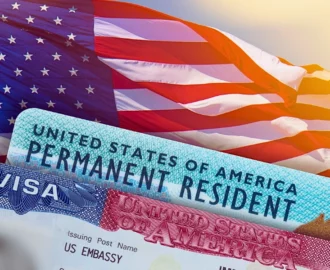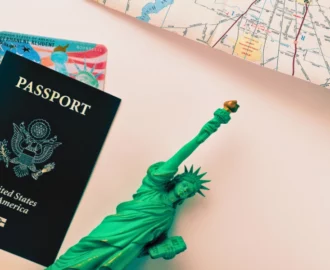Before entering the U.S. to begin living your version of the American Dream, you must meet the immigration vaccine requirements. The Advisory Committee for Immunization Practices (ACIP) maintains immunization recommendations for the U.S. population. The Centers for Disease Control and Prevention then assess whether those recommendations should extend to requirements for people seeking to immigrate to the U.S.

Knowing these requirements can help you avoid any issues during the medical examination portion of the immigration process, and potentially expedite receiving your approval to lawfully enter the U.S.
Navigating Immigration Vaccine Requirements in Illinois
If you’re wondering how to speed up the green card process, you may be able to do so by meeting all immigration vaccine requirements in Illinois. It’s important to know which vaccines to get and when to get them to avoid any issues during the immigration process.
Relevance of Immigration Vaccine Requirements
All immigrants must undergo a medical examination before receiving approval to enter the U.S. In the process, they must provide proof to doctors that they have received U.S.-required vaccines that prevent certain illnesses and their spread.
However, the required vaccines change depending on the circumstances, such as the risk that specific viruses present to the public.
Changes in Immigration Policies
Since immigration vaccine requirements change, there are key policy changes to keep in mind as you go through the immigration process.
One of the main changes to occur is the inclusion of new vaccination criteria from the U.S. Centers for Disease Control and Prevention (CDC). These three criteria include: Age-appropriate vaccinations for immigrant applicants, vaccination against diseases that can lead to an outbreak, and vaccination against diseases that the U.S. has either eliminated or is in the process of eliminating.
Additionally, travel bans may soon be lifted for fully vaccinated visa applicants. Lifting these bans could help reverse the effects resulting from the COVID-19 pandemic.
Common Vaccine-Prone Diseases
You will need to provide your immunization records during a medical exam prior to receiving a decision on your visa or green card application. Some required vaccines for immigrants include:
- Mumps
- Measles
- Polio
- COVID-19
- Rubella
- Hepatitis B
You’ll also need vaccines for tetanus, diphtheria toxoid, pertussis, seasonal flu, and Haemophilus influenza type B.
How Do Vaccines Impact Public Health Considerations
With the help of vaccines, countries across the globe are able to work together to eradicate many types of viruses. For example, people no longer contract smallpox and polio because of their respective vaccines. As a result, vaccines on a large scale can minimize the risk of viruses, and subsequently affect public health policies.
Generally, people who have received all required vaccines also have more freedom to travel in the country and abroad.
What Are the Benefits of Vaccination?
There are multiple benefits of getting vaccinated for various conditions. One of the main advantages of getting a vaccine is the ability to avoid severe illness from certain conditions. While people may still be able to contract the illnesses for which they received a vaccination, the likelihood of a severe illness is significantly lower. As a result, vaccinated individuals can avoid hospitalization and death that illnesses could otherwise cause.
In addition, getting vaccinated can help prevent the spread of illnesses to others. As your immune system more easily combats the vaccinated illness, you’ll overcome infection more easily and subsequently avoid infecting others. Other people who have received vaccinations will also benefit from more protection if you inadvertently expose them to an illness.
Common Concerns or Misconceptions
Some myths and misconceptions have led people to view vaccines as ineffective or even harmful, but the fact is that vaccines are typically safe and critical for helping combat dangerous illnesses.
One of the main misconceptions about vaccines is that they aren’t as effective as natural immunity. However, while natural immunity has its benefits, the risks of a natural infection make it worth it to get the vaccine instead. For instance, diseases like measles can cause inflammation in the brain or even death in many individuals when infected naturally. If people take the measles vaccine, they will be far less likely to experience these severe reactions and recover more effectively from the virus. Some vaccines can also be far more effective in immunizing individuals than natural infection.
Another misconception is that people are more prone to getting sick when vaccinated. While it’s true that vaccinated individuals could still contract an illness, people are generally more susceptible when unvaccinated. For instance, if you have a group of 1,000 vaccinated individuals and 20 unvaccinated individuals, you could see the same amount of infected people among each group when exposed to a virus. However, the percentage of people who contract the illness in the vaccinated group would be much smaller than that of the unvaccinated group.
One last big misconceptions about vaccines is that it’s no longer necessary to vaccinate against diseases that the U.S. or other countries have eradicated. However, diseases like polio are still present in other countries outside the U.S. Consequently, this could lead people from other countries to reintroduce the virus to the U.S., and potentially infect unvaccinated or previously uninfected individuals.
Determining Vaccine Eligibility and Required Vaccines Based on Immigration Status
Depending on your immigration status and how you want to enter the U.S., you may need to get certain vaccines. The CDC and immigration forms will list all the conditions for which you’ll need a vaccine, which can help you determine what vaccines to receive before entering the U.S.
After receiving every vaccine, you should maintain documentation proving that you received the immunization. You can then present this documentation to doctors when undergoing a medical exam while applying for a visa.
Additionally, an Illinois immigration legal services attorney can provide more information about immigration vaccine requirements and help ensure you meet them during the green card process.




